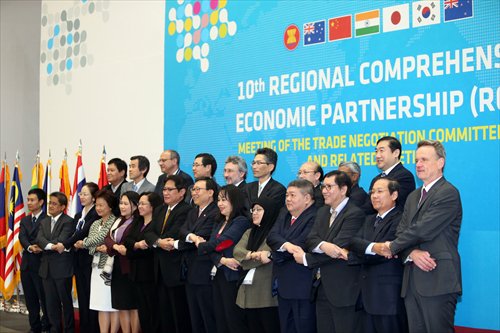Disputes give ASEAN member states leverage in negotiations: EU business leader
Disputes give ASEAN member states leverage in negotiations

Officials pose for photos before the 10th round of RCEP negotiations in October 2015 in South Korea. Photo: IC

Alberto Vettoretti Photo: Courtesy of Dezan Shira & Associates
Editor's Note:
Ahead of the award of the Permanent Court of Arbitration in The Hague on the South China Sea disputes, which is set be announced on Tuesday, Global Times reporter Zhang Ye (GT) on Monday interviewed Alberto Vettoretti (Vettoretti), vice chairman of the European Union Chamber of Commerce in China and managing partner of the pan-Asia organization Dezan Shira & Associates, to discuss the potential impact of the arbitration on China's trade relations with Southeast Asian countries, relations among the ASEAN member nations, and their negotiating positions in the Regional Comprehensive Economic Partnership (RCEP) and Trans-Pacific Partnership (TPP).
GT: What are the potential negative effects on China over its territorial rights claims in the South China Sea?
Vettoretti: On a variety of fronts, China has found itself at the crossroads with existing international institutions and norms. Increased presence in the South China Sea is no exception in the face of traditional US influence.
While South China Sea disputes help to assert Chinese influence militarily, they are likely to put China in an estranged situation with many of its key trading partners - significant assets in China's mission to solidify an economic foothold within the region.
Many countries within the region have hinted that they would be interested in joining the TPP in the future. A victory for China, China's refusal to accept rulings, or perceived lack of cooperation within ASEAN would certainly increase the prospects of this happening.
GT: China is actively pushing for an upgrade in the China-ASEAN free trade area and RCEP. Can these efforts and negotiations facilitate the settlement of the South China Sea disputes?
Vettoretti: The scope of these agreements does not currently cover such issues. However, it is likely that China may offer additional incentives in an effort to speed up the conclusion of RCEP or upgrades to the China-ASEAN FTA.
On the whole, spikes in political tension become unique opportunities for the US and China to shift the economic balance of power within Asia.
Given the importance of the region in countering the US pivot to Asia, individual member states may be able to leverage this opportunity to their benefit.
And in the short term, tensions resulting from the Philippines case are likely to make cooperation unpalatable for various countries. This may stall the process of concluding the RCEP.
GT: China is ASEAN's top trade partner with bilateral trade volume reaching $472 billion in 2015, according to official data from China's Ministry of Commerce. Will relations between China and ASEAN be influenced by the disputes and The Hague's decision?
Vettoretti: Regardless of the direction of The Hague's decision, ties between China and ASEAN will likely be too large for either party to ignore.
Although a real potential exists for certain ASEAN states to attempt to reduce China's influence within their economies, the importance of their eastern neighbor will be difficult to replace entirely. As the world's largest importer, significant industries and a majority of countries within ASEAN are heavily dependent on Chinese demand. Thus, even the most ambitious attempts to divert dependence will be met with little success and would likely do more harm than good.
From China's perspective, the ASEAN region is an important component of its response to the TPP. The longer negotiations drag on, the more of an advantage the US is likely to have in its pivot to Asia.
GT: The Philippines unilaterally filed an arbitration case against China over South China Sea disputes in The Hague court. Will members of the ASEAN reach an agreement on the South China Sea disputes, and what impact would this have on ASEAN?
Vettoretti: Increasing confrontation over South China Sea disputes has been a test of the regional bloc's cohesion. Similar to the EU and its response to Ukraine, ASEAN members differ substantially in their support for China as well as their positions on an effective response to its actions in the South China Sea.
As collective ASEAN statements have come under heated internal debate and publically embarrassing revisions, it is highly unlikely that ASEAN is going to find a common ground to act decisively in the event of a Chinese victory or disregard for a pro-Philippines ruling.
Internal disarray over a response to China is unlikely to spill over to ASEAN's internal economic arrangements.
The trade relationship the bloc enjoys is largely cemented as negotiations on the ASEAN Economic Community (AEC) are finished and concrete plans for further implementation have already been laid.
Newspaper headline: Q&A: EU business leader on possible impact of S.China Sea arbitration on trade